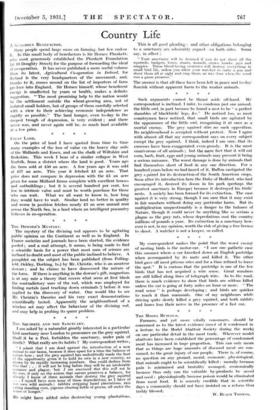Such arguments cannot be thrust aside off-hand. My correspondent is
inclined, I infer, to condemn just one animal, the little owl, in part because he found a nest to be " a perfect shambles of blackbirds' legs, &e." He noticed too, as most countrymen have noticed, that small birds are agitated by the appearance of the little owl, recognizing it at once as a mortal enemy. The grey squirrel stirs no such opposition. Its neighbOurhood is accepted without protest. Now I agree with almost all that my correspondent says on every subject except the grey squirrel. I think, indeed I am sure, that its excesses have been exaggerated, even grossly. It is the most omnivorous of all animals ; but the mere fact that it will eat corn, bark, fruit, eggs and young animals may prevent it being a serious nuisance. The worst damage is done by animals that find themselves short of food in any one direction. For a hundred years before we had heard of it, Buffon castigated the grey s mirrel for its destruction of the South American crops. Soon after its introduction here the Duke of Bedford, who had encouraged it, decreed its doom in his park (perhaps the greatest sanctuary in Europe) because it destroyed his birds' nests. A society has been formed for its extinction. The ease against it is very strong, though I am sure that it may exist in fair numbers without doing any particular harm. But its multiplication unquestionably is a danger to the balance of Nature, though it could never be anything like so serious a plague as the grey rats, whose depredations cost the country millions of pounds a year. Its extinction in a sanctuary how- ever is not, in my opinion, worth the risk of giving a free licence to shoot. A watcher is not a keeper, so called.










































 Previous page
Previous page